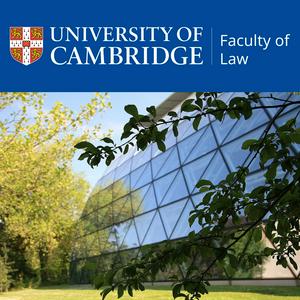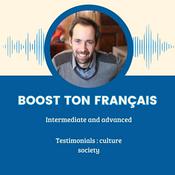Public Lectures from the Faculty of Law, University of Cambridge
Faculty of Law, University of Cambridge

Latest episode
531 episodes
- Speaker: Dr Svitlana Lebedenko, Assistant Professor at the University of Warwick and part-time Assistant Professor at the European University Institute.
Biography: Dr Svitlana Lebedenko specialises in innovation and industrial policy, law and technology, and intellectual property law. She is currently an Assistant Professor in the School of Law at the University of Warwick and a part-time Assistant Professor at the European University Institute, contributing to the Global Governance Programme of the Robert Schuman Centre for Advanced Studies. Previously, she was a Hauser Global Fellow at New York University School of Law's Engelberg Center on Innovation Law & Policy, a Max Weber Fellow at the European University Institute, a Research Fellow at the National Research University Higher School of Economics, and a Visiting Research Fellow at the University of Copenhagen's Center for Advanced Studies in Bioscience Innovation Law. Her first book, Russian Innovation and Intellectual Property: From Communism to Capitalism, is forthcoming with Cambridge University Press in 2026.
Abstract: Intellectual property has mainly been studied from the institutional and systems perspectives. While both have produced useful insights, neither really explains the spread of intellectual property, which, despite its numerous institutional failures, has never been rolled back. The talk introduces a technology perspective on intellectual property to provide a macro-level explanation of this phenomenon of resilience. Two propositions arise from conceptualising intellectual property as a technology. First, the efficiency and neutrality theses of technology serve as intellectual property anchors. Second, the evolutionary nature of technology means that changes to the tools of knowledge governance that may occur are likely to be bound by the limits of the dominant technological (intellectual property) paradigm. The talk will conclude by considering the descriptive and normative value of this technology perspective.
For more information see:
https://www.cipil.law.cam.ac.uk/seminars-and-events/cipil-seminars Artificial Intelligence and the future of financial stability: regulatory and supervisory gaps in the UK framework: 3CL Seminar
10/2/2026 | 37 mins.Speaker: Dr Clara Martins Pereira (Associate Professor of Financial Law, University of Durham)
Abstract: The increasing use of AI in finance is predicted to have mixed impact on financial stability: while AI can be used to help financial institutions and supervisors identify, manage, and monitor systemic risk, it can also increase the frequency and severity of crises by exacerbating existing vulnerability channels. Under the UK’s technology-agnostic approach to AI, algorithmic technologies are primarily governed through existing sectoral frameworks rather than bespoke regulation. I argue that this approach might be insufficient to mitigate their negative impact on financial stability. The features that separate AI from other technologies—opacity, autonomy, and adaptability—make existing regulatory frameworks and architectures a poor fit for tackling the financial systemic risk created by AI. Disclosure rules are undermined by ‘black box’ opacity and the unpredictability of autonomous algorithm-algorithm interactions, while ex-ante testing struggles to predict endogenous risks arising from those interactions and their systemic impact. Crucially, model risk management and operational resilience frameworks, often calibrated for acute disruptions and focused on individual firms, are ill-equipped to ensure systemic resilience when AI models drift in similar ways. The article concludes that mitigating the risks of AI for financial stability calls for a purposeful change towards specialised algorithmic governance rules, and a review of supervision and enforcement practices.
Dr Clara Martins Pereira is Associate Professor of Financial Law and Director for International Development at Durham Law School, Invited Professor at Católica Lisbon School of Law, and Global Associate Professor of Law at the University of Notre Dame. Her research focuses on financial law and regulation, technological innovation, and sustainable development. Clara holds a DPhil, MPhil, and Magister Juris from the University of Oxford, as well as an MSc in Law and Business and an LLB from Católica Lisbon. She has held academic roles at King’s College London, the University of Oxford, and the LSE, and served as a Visiting Scholar at Columbia Law School, Sapienza University of Rome, and the Max Planck Institute, among others. Formerly a capital markets lawyer at PLMJ, she has also acted as a consultant for organisations such as the World Bank and ICF.
3CL runs the 3CL Travers Smith Lunchtime Seminar Series, featuring leading academics from the Faculty, and high-profile practitioners.
For more information see the Centre for Corporate and Commercial Law website:
http://www.3cl.law.cam.ac.uk/- Speakers: Prof Mads Andenas & Prof Johann Ruben Leiss, University of Oslo
Lecture summary: The lecture explores the systemic function of general principles in international law in light of the ongoing work of the ILC on general principles of law and recent practice of international courts and tribunals, such as the Climate Change Advisory Opinion of the International Court of Justice from 2025. In its first part, the lecture examines the ILC’s approach to the systemic function of general principles and comments of states on the ILC’s work. In its second and third part, the lecture discusses the two main features of the systemic function of general principles, namely their contribution to inter-norm and inter-systemic coherence in international law. All general principles potentially fulfil a systemic function by their gap-filling role and inter-systemic communication through Article 38(1)(c) ICJ Statute. Several general principles have a systemic pull in inter-norm contexts as interpretative guidelines and inter-norm harmonisers and coordinators. In the relationship between different (sub)orders of international law (including European law and national legal orders applying international law), several principles provide for ‘hinge’ mechanisms and inter-system harmonisers which open legal (sub)orders to one another, and integrate them into (relative) unity, while others serve as inter-system coordinators or mechanisms for conditional closure of legal orders. This means, all general principles have a systemic function, whereas certain principles have more direct systemic function by virtue of their normative content. Through their systemic function, general principles contribute as a central cohesive force furthering international law’s character as a legal and (relative) unitary system. This system is characterized by a complex and dynamic interplay between a plurality of legal norms, orders, and sub-orders, including national legal orders, through systemic principles of openness, coordination, and conditional closure.
Chair: Prof Campbell McLachlan
This lecture was given on 6 February 2026 and is part of the Friday Lunchtime Lecture series at the Lauterpacht Centre. - Speaker: Dr Poorna Mysoor, CIPIL, University of Cambridge
Biography: Dr Poorna Mysoor is a Fellow in Law at Lucy Cavendish College, University of Cambridge. She was a Leverhulme Trust Early Career Fellow at Oxford Law Faculty. She is the author of two books, Copyright as Personal Property (2025) and Implied Licences in Copyright Law (2021), both published with Oxford University Press, and of other peer reviewed journals articles. Poorna obtained her undergraduate law degree at NLSIU, Bangalore, LLM from SOAS, University of London and DPhil from Oxford Law Faculty. Before embarking on her doctorate, Poorna practised intellectual property law for several years in Hong Kong and was a litigator in India.
Abstract: Many scholars argue that recognising copyright as a property right leads to expansion. The argument is that property rights empower the owners disproportionately with little regard to the interests of other stakeholders. In this presentation the speaker seeks not only to debunk this argument to show instead the limiting role played by property rights and its impact on copyright. Drawing from her recently published monograph, ‘Copyright as Personal Property’ the speaker will put forward relevant analogies from land law and personal property law in support of her arguments. She seeks to demonstrate tat copyright expansion can indeed be reined in by adopting, and not disregarding, the property framework in the characterisation of copyright.
For more information see:
https://www.cipil.law.cam.ac.uk/seminars-and-events/cipil-seminars Chilling Effects: Repression, Conformity, and Power in the Digital Age: CIPIL/CPL Lunchtime Seminar
04/2/2026 | 41 mins.Speaker: Professor Jon Penney (Osgoode Hall Law School, York University, Toronto)
In this talk, Jon Penney explores key themes from his new book Chilling Effects: Repression, Conformity, and Power in the Digital Age (Cambridge University Press, 2025), which examines the increasing weaponization of surveillance, censorship, and new technology to repress and control us. With corporations, governments, and extremists employing big data, artificial intelligence, FRT, cyber-mobs, and other technological threats to limit our rights and freedoms, concerns about chilling effects—or how these activities deter us from exercising our rights—have become urgent. Penney draws on law, privacy theory, and social science to present a new conformity theory that highlights the dangers of chilling effects and their potential to erode democracy and enable a more illiberal future. Following the book’s urgent and timely message, he sheds light on the repressive and conforming effects of technology, state, and corporate power and offers a roadmap of how to respond to their weaponization today and tomorrow.
Biography: Jon Penney is a legal scholar and social scientist at Osgoode Hall Law School, York University, Toronto, where he is an Associate Professor and holds the York Research Chair in Artificial Intelligence, Data Governance, and the Law. He is also a Faculty Associate at Harvard’s Berkman Klein Center for Internet & Society and Senior Research Fellow at the University of Toronto’s Citizen Lab. His award-winning research on privacy, technology, and human rights has received national and international attention, including coverage in the Washington Post, the New York Times, Reuters International, The Guardian, and Le Monde, among others, and has been profiled in WIRED and Harvard Magazine.
For more information see:
https://www.cipil.law.cam.ac.uk/seminars-and-events/cipil-seminars
https://www.cpl.law.cam.ac.uk/
More Education podcasts
Trending Education podcasts
About Public Lectures from the Faculty of Law, University of Cambridge
The Faculty of Law has a thriving calendar of lectures and seminars spanning the entire gamut of legal, political and philosophical topics. Regular programmes are run by many of the Faculty's Research Centres, and a number of high-profile speakers who are leaders in their fields often speak at the Faculty on other occasions as well.
Audio recordings from such events are published in our various podcast collections. Video recordings are available via YouTube.
Podcast websiteListen to Public Lectures from the Faculty of Law, University of Cambridge, Keep The Change and many other podcasts from around the world with the radio.net app

Get the free radio.net app
- Stations and podcasts to bookmark
- Stream via Wi-Fi or Bluetooth
- Supports Carplay & Android Auto
- Many other app features
Get the free radio.net app
- Stations and podcasts to bookmark
- Stream via Wi-Fi or Bluetooth
- Supports Carplay & Android Auto
- Many other app features


Public Lectures from the Faculty of Law, University of Cambridge
Scan code,
download the app,
start listening.
download the app,
start listening.







































